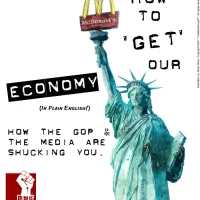Beneficent Big Brother or Malignant Monopoly? Is Google is the New Borg?
 Last week, the most powerful company in the world became even more powerful. GOOGLE, Inc. of Mountain View California, just went into the cellphone and cable TV markets, purchasing Motorola Mobility for $12.5B. Google likes you to think of them as your fuzzy, open-source buddy. They are Big Brother, a corporate BORG, constantly learning and sucking the viability out of industry.
Last week, the most powerful company in the world became even more powerful. GOOGLE, Inc. of Mountain View California, just went into the cellphone and cable TV markets, purchasing Motorola Mobility for $12.5B. Google likes you to think of them as your fuzzy, open-source buddy. They are Big Brother, a corporate BORG, constantly learning and sucking the viability out of industry.
Google has learned the lesson of monopoly stripping from Microsoft. Make yourself big and scary, and the antitrust lawyers will come calling. Be adept at looking like the public champions, and the Justice Department leaves you alone.
They have managed to plunder the advertising coin of major newspapers and magazines, advertising, and web publishing keeping the web enslaved to its vast collective. They have their sights set on dominating music, entertainment, mobile telephony and, soon, the auto industry.
Google has always tried to come off as a white knight in the public eye, even when they are doing things that clearly are motivated out of the self-interest of preserving and growing the collective.
One of Google’s acts of faux selflessness? Standing up for Net Neutrality legislation.
Internet pipeline companies, the folks who set up your access to the Internet, like an AT&T or a Comcast, act like the European river pirates of old. They all want to put their tollbooth on your digital Rhine, and make you pay to access it, or control how you use it to enrich themselves.
Google was instrumental in lobbying to block cable operators. Why? Cable tollbooths on the information superhighway would be the biggest threat to Google’s search engine business. It would force them to bid with competitors like Yahoo! to pay to be the search engine of choice when users log on to the web. That, in turn, could substantially hurt their advertising business which relies on learning your search patterns to deliver targeted marketing to you.
The Net Neutrality spat with the cable operators creates one very large hurdle for Google’s Motorola deal: They now must work with those very same companies as the new owners of Motorola Mobility, which makes set-top boxes for the cable industry. Reuters writes:
“While the mobile device business of Motorola Mobility has naturally attracted most of the attention, cable executives immediately noticed that for them the deal means working with a company they have clashed with in the past on a range of issues from so-called net neutrality to piracy.”[1]
Phone service providers have also joined the cable companies in their suspicion of a Google the Great:
“[T]he prospect of Google turning into another Apple [supplying the OS, handset and eco-system] will not be greeted with enthusiasm by European operators,” David McQueen, principal analyst with Informa Telecoms & Media, told FierceWireless:Europe[2]
The cable companies are examining whether Google absorbing their set-top boxes into the collective will mean that they will eventually be absorbed as well.
Standard & Poors (S&P) met the announcement with a move on Google stock from a buy rating to a sell. See Scott Kessler’s take in a Washington Post video interview here. The San Jose Mercury News, the Silicon Valley’s media outlet, was equally dour:
“If Google bought Motorola just to run it like it’s already been run, then what’s the point? One would think that in order to justify the expense beyond the patents, they have some ideas or are expecting to come up with some ideas to be as disruptive in (mobile devices) as they are in everything else,” said Steven Levy, the veteran Google-watcher and author of “In The Plex,” a book about the inner workings of the search and software giant.”[3]
The point may also be to kill off its competition. The Motorola deal will crush the mobile location services competitor Skyhook Wireless, which filed suit against Google when it tried to block a deal with Motorola to use its services rather than Big G’s in Motorola’s Android phones last year. Owning Motorola, Google can kill the deal, and put a scare into any other start-up company that might think of creating other products, apps, or services that compete with them.[4]
The all-cash acquisition of Motorola without financing proves that the pain being inflicted on the economy is artificial, as most big corporations books are fat with cash sitting on the sidelines. Reuters reports:
“After record corporate profits in 2010 and 2011, companies are flush with cash that is diluting or not earning interest. Rather than let it sit on their balance sheets or give it back to shareholders, many companies are putting it to work via acquisitions.” [5]
Google, in particular, is flush:
“Google has $39 billion of cash earning zero and an existing $4 billion loan. I’m not sure they need to borrow anything,” a senior banker said. “It’s an all-cash acquisition. With $39 billion of cash, which is growing at $10 billion a year, it’s highly unlikely they will borrow. I don’t see any need for it.” [6]
Beyond the Browser: OS & Email Domination
Telephony and set top boxes are not Google’s only ambitions. The company is trying to go head-to-head with Microsoft and Apple as an operating system maker. The Chrome OS for PCs is months behind in development. Reports were that it was going to make a June debut, but thus far, nothing.
The company launched a Facebook-killer called Google + which has been more fizzle than sizzle.
Gmail, however, is one place where Google is making deep inroads into control of critical customer services. They are aggressively going after educational and corporate enterprise customers who use Microsoft or other mail servers.
Dominating the Other Great Personal Device: The Car
Their biggest achievement at the moment is one of their least heralded: The self-piloting Google Car. At the end of June, Google’s pull of the lobbying slot machine handle in Nevada went three-bars: Google’s driverless cars are now street-legal in Nevada. See the video for more about this self-driving vehicle:
One could imagine that Google would profit handsomely from selling an exclusive rights deal to that technology to an auto manufacturer. Of course, with an enterprise value of just around $13.89B, Google could also just buy up General Motors… quite possibly as an all cash deal. That is how big the company has become.
It may seem like Star Wars technology, but the pilotless cars have been quietly tested nationwide by Google and look to be its next HUGE thing. Pilotless cars could replace taxis and buses in city fleets. Personal versions would be a hot commodity. The company stands to make billions more on just that invention alone, which is admirable, but also calls into question how much control of our daily lives one corporation, beneficent or not, should have.
How Google Milks the Cash Cow Herd
How did the company make the majority of its money? As the gatekeeper of the largest search engine in the known world, Google leveraged that power to buy up online advertising companies. In turn, Google put the screws to traditional advertising. Why contract with a newspaper, or a blogger, when Google can provide you hundreds of them with one-stop shopping? That was the original pitch. Google then refined it further.
Everything that you do with Google is monitored, processed, digested. When you go to the bank, go the bank that, if you use your iPhone to get a map that gets you there, Google will log your journey as part of what it knows about you. When you search for items, Google not only uses it to refine the search experience for you. They compile all of that data to be able to target their advertising engine to deliver marketing information that allegedly is more of what you want to see.
To get the benefit of the service that gives you directions, or helps you find the best macaroni and cheese recipe, you are trading them, for free, all kinds of data that consumer marketing companies used to have to ask for.
One of the reasons that Google freaks over other companies taking over any corner of its data acquisition on consumers like you is because it affects their ability to maintain that control of your world. Skyhook, suing Google, was able to get email traffic that was squelched by management. The New York Times reported that Steve Lee, an Android product manager wrote this about Skyhook developing a competing Android service:
“That would be awful for Google,” Mr. Lee wrote, “because it will cut off our ability to continue collecting data to maintain and improve our location database.”
More discussion of Skyhook continued until Patrick Brady, a partner manager at Google, who has obviously learned from Microsoft about the dangers of email, wrote on June 25, 2010:
“PLEASE DO NOT! Thread-kill and talk to me off-line with any questions.”
Google Chokes the Life Out of its Hosts
Google has destroyed the revenue models in newspaper and periodical publishing. It is virtually impossible for most publishing businesses, unless they port millions of paper readers over to the web, to scratch up enough revenue to pay for their staffs of professional writers, photographers, and editorial people. Local publications with 50K or 60K in readership used to be viable. Now don’t even try that on the web. When you hit 1.5M readers or so, you might eek enough out of Google to make your publishing pay. There are competing advertising firms, but they are dwarfed by Google’s dominance of the ad game, and they pay equally poorly for most small and medium-sized publishers.
They wanted to do the same thing to books that they have done to newspapers periodicals, but Authors and publishers stopped Google’s attack on copyright when the Google Library project ran into a New York federal judge in March. The New York Times reported that a settlement deal with the publishing industry ran afoul of this funny thing called copyright:
“The company’s plan to digitize every book ever published and make them widely available was derailed on Tuesday when a federal judge in New York rejected a sweeping $125 million legal settlement the company had worked out with groups representing authors and publishers…
“But citing copyright, antitrust and other concerns, Judge Denny Chin said that the settlement went too far. He said it would have granted Google a ‘de facto monopoly’ and the right to profit from books without the permission of copyright owners.
“Judge Chin acknowledged that ‘the creation of a universal digital library would benefit many,’ but said that the proposed agreement was “not fair, adequate and reasonable.’”
The company acquired YouTube in 2006. As the world’s media morphs together, and more young people seek out shorter “homebrew” comedies and videos, YouTube may become the primary distributor of short and long form video content. The Film and Television companies have created rival services, but YouTube’s ubiquity, powered by Google’s search engine which finds their content first and foremost, makes it hard for competitors to gain much traction.
Is Google a Monopoly?
CNN Money asked the federal prosecutor who went after Microsoft:
“Having prosecuted the Microsoft case, its seems to me that Google, as a monopoly, is engaging in the same tactics to keep its dominant position as Microsoft was engaging in,” Miller says. “Those are the same tactics that got Microsoft in trouble.” said prosecutor Samuel Miller. [7]
Microsoft, long the bully on the block, filed a complaint with the European Union’s commission that regulates enterprise at the end of March. Apple, which used to work collaboratively with Google, now launches legal attacks over patent infringements of its Android OS.
Google is a learning organization. It grows as it learns. It finds a number of ways to serve the collective. It also enriches itself on content that it neither created nor hosted, without having the overhead of having to create a shred of the billions of pages of content that it locates for end users. From searches to advertising to mobile web to operating systems to cars its corporate fingers are slowly sucking in every major revenue stream of the world economy. It is a corporate weed that is strangling the world economic host that it feeds on.
It shouldn’t take a genius to figure out that Google is a monopoly that needs to be broken up.
Thankfully it doesn’t take a genius, because the antitrust division of the United States Department of Justice doesn’t seem to have too many geniuses amongst them. Otherwise they would have moved on Google’s practices over the last three years of the Obama Administration. Google got a free ride from the Bush privateers at the beginning of the decade.
It’s time to earn your keep, Mr. Holder. Resistance is not futile. Otherwise, you and the rest of us will be absorbed.
My shiny two.










